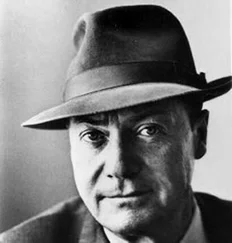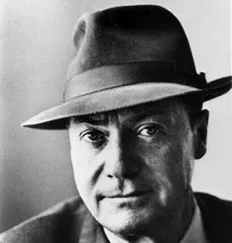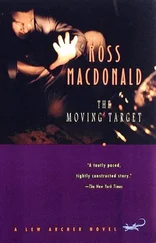“Your daughter’s at sea with a teen-age dropout, under suspicion of child-stealing and murder. And you don’t want to disturb her father.” I got up and opened the door of the sitting room: “If you won’t call your husband, I think I’d better.”
“ I will, if you insist.”
As she passed me in the doorway I could feel the small chill presence that lived like a stunted child in her fine body. The same cold presence reflected itself in the room. The chandelier for all its blaze was like a cluster of frozen tears. The white marble mantel was tomblike. The flowers in the vases were plastic, unsmellable, giving off a dull sense of artificial life.
Lester Crandall came into the room as if he was the visitor, not I. He was a short heavy-bodied man with iron gray hair and sideburns which seemed to pincer his slightly crumpled face and hold it out for inspection. His smile was that of a man who wanted to be liked.
His handshake was firm, and I noticed that his hands were large and rather misshapen. They bore the old marks of heavy work: swollen knuckles, roughened skin. He had spent his life, I thought, working his way to the top of a small hill which his daughter had abandoned in one jump.
He was wearing a figured red-silk bathrobe over undershirt and trousers, and his face was rosy-purplish, his hair damp from the shower. I told him I was sorry to disturb him.
He waved the thought away. “I’d be glad to get up at any hour of the night, believe me. I understand you have word of my little girl?”
I told him briefly what I knew. Under the pressure of my words his face seemed to be forced back on its bones. But he refused to admit the fear that was making his eyes water.
“There must be a reason for what she’s doing. Susan’s a sensible girl. I don’t believe she’s been taking drugs.”
“What you believe won’t change the facts,” I said.
“But you don’t know her. I spent most of the evening traipsing up and down the Sunset Strip. It gave me a real insight into what’s happening to the youth of today. But Susan isn’t like that at all. She’s very organized at all times.”
He sat down heavily in one of the conversation chairs, as if the little speech on top of the long evening had exhausted him. I sat in the other.
“We won’t argue,” I said. “One good lead is worth all the theories in the world.”
“You’re very right.”
“May I see Susan’s address book? I understand you have it.”
He looked up at his wife, who was hovering near him. “Would you get it for me, Mother? It’s on the desk in the library.”
After she left the room, I said to Crandall: “When something like this happens in a family, there’s nearly always some advance warning. Has Susan been in any kind of trouble lately?”
“None at all. Never in her life, if you want the truth.”
“Any drinking?”
“She doesn’t even like it. I give her a taste of my drink now and then, but she always makes a face.”
He made one himself. It stayed imprinted in his flesh as an expression of dismay. I wondered what he was remembering or trying to forget.
“What does she do for fun?”
“We’re a very close family,” he said. “The three of us spend a lot of time together. I own some motels up and down the coast, and the three of us go on a lot of little trips combining business and pleasure. And of course Susan has her activity program – tennis and diving lessons and French conversation.”
He was like a man with his eyes closed trying to put his hands on a girl that wasn’t there. I began to think I had a glimmering of the problem. It was often the same problem – an unreality so bland and smothering that the children tore loose and impaled themselves on the spikes of any reality that offered. Or made their own unreality with drugs.
“Does she spend much time on the Strip?”
“No sir, she never goes there – not to my knowledge.”
“Why did you?”
“A policeman suggested it to me. He said it’s a port of missing girls and he thought I might see her there.”
“What kind of boys does she run with?”
“She doesn’t have too much to do with boys. She’s gone to some supervised parties, of course, and we’ve sent her to dancing school for years – ballroom as well as ballet. But as for boys, frankly I’ve discouraged it, the state of the modern world being what it is. Most of her friends and acquaintances are girls.”
“What about Jerry Kilpatrick? I understand he visited your daughter.”
Crandall flushed. “Yes. He came here back in June. He and Sue seemed to have a lot to talk about, but they shut up when I came into the room. I didn’t like that.”
“Didn’t you have an argument with him?”
He gave me a quick narrow look. “Who told you that?”
“Your wife did.”
“Women always talk too much,” he said. “Yes, we had an argument. I tried to straighten the boy out on his philosophy of life. I asked him in a friendly way what he planned to do with himself, and he said all he wanted was just to get by. I didn’t think that was a satisfactory answer, and I asked him what would happen to the country if everybody took that attitude. He said it had already happened to the country. I don’t know what he meant by that, but I didn’t like his tone. I told him if that was his philosophy of life he could leave my home and not bother coming back. The little twerp said he’d be glad to. And he left and never did come back. Which was good riddance of bad rubbish.”
Crandall’s face was dusky red. A pulse at the side of his forehead throbbed. My sore head throbbed in sympathy.
“Mrs. Crandall thought at the time I’d made a mistake,” he said. “You know how women are. If a girl isn’t married or at least engaged by age eighteen, they think she’s bound to be an old maid.” Crandall lifted his head as if he’d picked up a signal that was inaudible to me. “I wonder what Mother’s doing in the library.”
He got up and opened the door of the room, and I followed him down the hall. His body moved heavily and dolefully, as if it was weighted down by a kind of despair which hadn’t yet reached his consciousness.
The sound of a woman crying came through the library door. Mrs. Crandall was standing up and sobbing against a wall of empty shelves. Crandall went to her and tried to quiet her shaking back with his hands.
“Don’t cry, Mother. We’ll get her back.”
“No.” She shook her head. “Susan will never come back here. We had no right to bring her here in the first place.”
“What do you mean?”
“We don’t belong in this place. Everybody knows it except you.”
“That’s not true, Mother. I’ve got a higher net worth than anybody on this block. I could buy and sell most of them.”
“What good is net worth? We’re like fish out of water. I’ve got no friends on this street – and neither has Susan.”
His large hands grasped her shoulders and forced her to turn and face him. “That’s just your imagination, Mother. I always get a friendly smile and nod when I drive past. They know who I am. They know I’ve got what it takes.”
“Maybe you have. It doesn’t help Susan – or me.”
“Help you do what?”
“Just live,” she said. “I’ve been trying to pretend that everything is okay. But now we know it isn’t.”
“It will be. I guarantee it. Everything will be hunky-dory again.”
“It never was.”
“That’s nonsense, and you know it.”
She shook her head. He reached up and stopped her movement of denial with his hands, as if it was merely a physical accident. He pushed the hair back from her forehead, which looked clear and untroubled in contrast with her tear-streaked face.
Читать дальше












